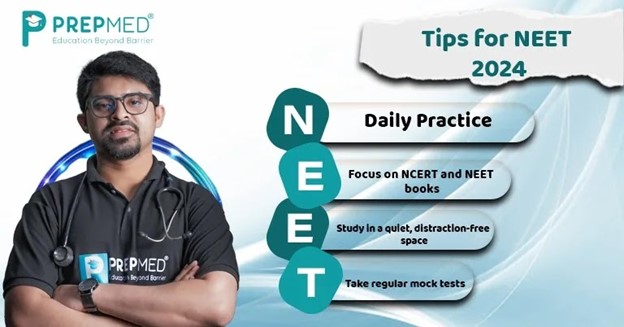September 02, 2024
Tips for NEET 2024 – Plan, Study, and Materials
Students all across India take the National Eligibility and Entrance Test (NEET) to try and get into medical or dental school. Before taking the test, NEET candidates should understand the basics of the exam and be well-versed in the syllabus and study materials for success.
What is the NEET 2024 Syllabus?
The NEET UG exam tests knowledge in Chemistry, Physics, and Biology. You have three hours to answer 180 multiple-choice questions, with 4 points for every correct answer and a deduction of 1 point for every wrong answer. To prepare well, it’s crucial to have a solid understanding of the entire NEET syllabus.
Join PrepMed and pave the way to a successful and fulfilling medical career!
Important Topics to Focus On
- Biology: Ecology & Environment, Genetics, Cell Biology, Basics of Biotechnology, Morphology, Physiology of Animals & Plants, Reproduction.
- Chemistry: General Organic Chemistry, Periodic Table, Coordination Chemistry, Mole Concept, Chemical Bonding.
- Physics: Optics, Nuclear Physics, Mechanics, Thermodynamics.
NEET Study Material
NEET covers 97 NCERT chapters from classes 11 and 12. Choose the right NEET books and study materials, prioritize accurate knowledge, and take notes without hesitation. Some NEET-specific books are helpful and don’t overlook the summary in NCERT.
Join Now for NEET-UG 2024 Test Discussion & Mentorship (Fingertips Plan)!
NEET Preparation Tips
Physics
- In-Depth Understanding: Master all Physics concepts and daily practice questions.
- Learn Questions: Understand NEET questions before answering; focus on NCERT and NEET books.
- Notes While Studying: Jot down key definitions, formulas, and points for easy revision.
- Formulas: Practice Physics formulas instead of memorizing them; understand the logic.
- Past Exams: Solve as many NEET physics problems as possible from books with model question papers.
- Mock Tests: Take regular mock tests to prepare for the actual exam.
Chemistry
- In-Depth Understanding: Improve NCERT expertise and daily practice.
- Learn Questions: Read and comprehend NEET questions, avoid JEE-level challenges.
- Notes While Studying: Stick to one or two coaching materials and make quick notes for revision.
- Formulas: Practice Chemistry formulas; understand the logic behind them.
- Past Exams: Solve NEET chemistry problems from model question papers.
- Mock Tests: Regularly take mock tests to enhance efficiency and time management.
Biology
- In-Depth NCERT: Focus on NCERT Biology textbook; review tables and graphics.
- Learn Questions: Spend more time on physiology, reproduction, genetics, and ecology; rethink basic dogma in genetics.
- Practice: Solve as many practice problems as possible and take practice exams.
- Last-Minute Preparation Tips
- NCERT: Start with NCERT books, cover additional topics later, and keep practicing complex concepts.
- Strengths and Weaknesses: Recognize strengths, focus on them, and gradually include challenging areas.
- Revision of Notes: Review self-notes with essential formulas and diagrams; avoid learning new topics.
- Practice: Take online mock tests and solve previous years’ question papers regularly.
Relaxation Tips
- Study Breaks: Take short breaks every two hours.
- Sleep Schedule: Follow a 6-7-hour sleep schedule.
- Distraction-Free Environment: Study in a quiet, distraction-free space.
- Check Messages: Set aside time to check emails and texts.
How to Prepare Revision Notes for the NEET 2024 Exam?
- Note-taking Style: Choose a learning style that suits you—visual, reading, writing, or kinesthetic.
- Following the Syllabus: Study the NCERT-dominated syllabus and use reputable sources for additional topics.
- Take Notes at the Right Time: Take notes after studying a chapter multiple times and reviewing question papers.
Specific Note-Taking Tips for Each Subject
- Physics: Write down formulas and derivations; summarize each chapter into one or two note pages.
- Chemistry: Focus on Organic chemistry, note formulas, and extract key points for Inorganic and Physical chemistry.
- Biology: List important information you frequently forget and keep your biology notes concise.
Follow Us - on Facebook /Instagram/ YouTube






